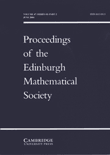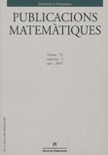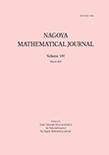
ANNALS OF MATHEMATICS
Scope & Guideline
Connecting Theory and Application in Mathematics
Introduction
Aims and Scopes
- Algebraic Geometry and Number Theory:
This area encompasses research on varieties, schemes, and their properties, as well as the interaction between number theory and algebraic geometry, including conjectures and proofs related to modular forms and arithmetic geometry. - Topology and Geometry:
The journal often features works on various topological spaces, homology, and geometric structures, including studies of manifolds and their properties in different dimensions. - Analysis and Differential Equations:
Papers in this scope focus on real and complex analysis, partial differential equations, and dynamical systems, exploring both theoretical developments and applications. - Representation Theory and Lie Algebras:
Research on representations of groups and algebras, including studies of symmetry, invariants, and their applications in various mathematical contexts. - Combinatorics and Graph Theory:
The journal includes articles that explore combinatorial structures, graph properties, and their interactions with other mathematical disciplines. - Mathematical Physics:
This scope covers the mathematical foundations of quantum mechanics, statistical mechanics, and other areas where mathematics intersects with physical theories.
Trending and Emerging
- Higher-Dimensional Algebra:
Research in higher-dimensional algebra and category theory is increasingly prominent, indicating a growing interest in abstract structures that generalize classical algebraic concepts. - Mathematical Aspects of Machine Learning:
Emerging studies exploring the mathematical foundations and implications of machine learning algorithms signify a trend where mathematics meets computational sciences, reflecting the interdisciplinary nature of modern research. - Nonlinear Dynamics and Chaos Theory:
The exploration of nonlinear dynamics, particularly in the context of differential equations and dynamical systems, is becoming more frequent, highlighting an interest in complex systems and their behaviors. - Geometric and Topological Data Analysis:
With the rise of data science, there is an increased focus on using geometric and topological techniques to analyze and interpret high-dimensional data, marking a significant intersection between mathematics and applied fields. - Quantum Computing and Information Theory:
As quantum technologies advance, research into the mathematical underpinnings of quantum computing and information theory is emerging as a vital area of interest, showcasing the relevance of mathematics in cutting-edge technology.
Declining or Waning
- Classical Geometry:
Research specifically focused on classical geometric concepts, such as Euclidean and non-Euclidean geometries, has seen a decrease in frequency. This may be due to the shift towards more abstract and higher-dimensional geometric theories. - Elementary Number Theory:
While number theory remains a vibrant field, traditional topics such as elementary techniques and classical results are less frequently encountered in recent publications compared to more advanced or abstract approaches. - Combinatorial Games:
The study of combinatorial games, while still relevant, appears to be less prominent in the journal’s recent issues, possibly overshadowed by more pressing or complex mathematical problems.
Similar Journals

Pure and Applied Mathematics Quarterly
Cultivating Dialogue in the Evolving World of MathematicsPure and Applied Mathematics Quarterly is a prestigious journal published by INT PRESS BOSTON, INC, focusing on the diverse and evolving field of mathematics. Since its inception in 2007, this journal has grown significantly, currently holding a Q1 ranking in the Mathematics (Miscellaneous) category for 2023, positioning it among the leading publications in the discipline. With a commitment to publishing high-quality research, Pure and Applied Mathematics Quarterly fosters innovation and dialogue within the mathematical community by providing a platform for theoretical advancements and practical applications. The journal remains accessible to researchers and professionals through its ISSN 1558-8599 and E-ISSN 1558-8602, although it does not currently offer open access. As a vital resource for mathematicians, educators, and students, this journal endeavors to expand the frontiers of mathematical knowledge and contribute to the academic dialogue surrounding this fundamental science.

Forum of Mathematics Sigma
Exploring the depths of mathematical excellence.Forum of Mathematics Sigma is a premier open access journal published by Cambridge University Press that has been at the forefront of mathematical research since its inception in 2013. With a strong emphasis on advancing the fields of mathematics, the journal consistently achieves Q1 rankings across multiple categories, including Algebra and Number Theory, Analysis, and Computational Mathematics. This distinction highlights its impact and relevance within the scholarly community. The journal prides itself on providing a platform for innovative research, fostering collaboration among researchers and practitioners across various mathematical disciplines. Open access publication ensures that cutting-edge findings are widely available to readers globally, enhancing the dissemination of knowledge. With an address in the heart of Cambridge, England, Forum of Mathematics Sigma is dedicated to promoting high-quality research and making significant contributions to the development of mathematics.

JOURNAL OF THE EUROPEAN MATHEMATICAL SOCIETY
Catalyzing Progress in Applied and Theoretical MathematicsThe JOURNAL OF THE EUROPEAN MATHEMATICAL SOCIETY, published by the EUROPEAN MATHEMATICAL SOCIETY (EMS), stands as a premier platform in the field of mathematics, known for its rigorous editorial standards and impactful contributions to both applied and theoretical aspects of the discipline. With a commendable Q1 ranking in both Applied Mathematics and Miscellaneous Mathematics categories, alongside a Scopus rank of 32 out of 399 in General Mathematics, this journal has established itself as a crucial resource for researchers and professionals. Since achieving Open Access status in 2021, it has expanded its reach, making cutting-edge research more accessible to a global audience. With a publication horizon extending from 2002 to 2024 and a dedicated focus on high-quality mathematical scholarship, the journal continues to foster innovation and collaboration within the mathematical community.

CANADIAN JOURNAL OF MATHEMATICS-JOURNAL CANADIEN DE MATHEMATIQUES
Fostering collaboration and innovation in mathematics.Canadian Journal of Mathematics - Journal Canadien de Mathématiques is a prestigious peer-reviewed journal published by Cambridge University Press, which aims to advance the field of mathematics through the dissemination of high-quality research articles. With its ISSN 0008-414X and E-ISSN 1496-4279, the journal plays a pivotal role in fostering mathematical research and collaboration. It has been recognized for its impactful contributions, currently holding a category quartile ranking of Q2 in Mathematics (miscellaneous) for 2023 and sits in the 66th percentile among its peers according to Scopus rankings. As the journal continues its convergence from its inception in 1994 through to 2024, it remains a vital resource for researchers, professionals, and students seeking to stay at the forefront of mathematical developments. The journal does not operate under an open access model, allowing for a curated collection of articles that adhere to rigorous academic standards.

Bulletin Mathematique de la Societe des Sciences Mathematiques de Roumanie
Exploring the Depths of Theoretical and Applied MathematicsThe Bulletin Mathematique de la Societe des Sciences Mathematiques de Roumanie, published by SOC MATEMATICE ROMANIA, is a distinguished platform dedicated to the dissemination of advanced mathematical research and developments. With ISSN 1220-3874 and E-ISSN 2065-0264, this journal serves the global mathematical community, particularly in Romania, fostering collaboration and innovation in varied mathematical disciplines. Despite being categorized in the Q3 quartile of the *Mathematics (miscellaneous)* field and holding a Scopus rank placing it in the 19th percentile, the journal remains committed to publishing high-quality articles that explore theoretical and applied mathematics. Running from 2008 to 2024, it aims to encourage the sharing of knowledge and advancements within both academic and practical domains, affirming its importance as a valuable resource for researchers, professionals, and students alike. Although the journal does not currently offer open access, it contributes to the mathematical discourse through the rigorous selection of papers that adhere to high scholarly standards.

PROCEEDINGS OF THE EDINBURGH MATHEMATICAL SOCIETY
Fostering innovation in mathematical research.PROCEEDINGS OF THE EDINBURGH MATHEMATICAL SOCIETY, published by Cambridge University Press, stands as a cornerstone within the realm of mathematical research, providing a platform for original papers that push the boundaries of various mathematical disciplines. With a rich history dating back to 1883, this journal has evolved through several converged years, reflecting the dynamic nature of mathematical inquiry. As a Q2 category journal in the field of Mathematics (miscellaneous) according to the latest rankings, it situates itself within the upper tier of academic publications, offering an essential resource for researchers and professionals alike. While it currently does not offer open access options, the journal's contributions are invaluable, facilitating dialogue and collaboration among scholars. The journal's commitment to advancing mathematical knowledge makes it a vital publication for those engaged in the study and application of mathematical theories and principles.

INDIAN JOURNAL OF PURE & APPLIED MATHEMATICS
Cultivating Knowledge in the Mathematical SciencesINDIAN JOURNAL OF PURE & APPLIED MATHEMATICS, published by the INDIAN NATIONAL SCIENCE ACADEMY, stands as a vital resource in the realm of pure and applied mathematics since its inception in 1996. With ISSN 0019-5588 and E-ISSN 0975-7465, this journal aims to disseminate original research that advances the understanding and application of mathematical principles. Operating out of New Delhi, India, it serves a diverse readership comprising researchers, scholars, and practitioners in the mathematical sciences. Recognized within the Q3 category in both Applied Mathematics and Miscellaneous Mathematics as per the 2023 category quartiles, the journal emphasizes rigorous peer-reviewed articles that contribute to its impact in academia, reflected in its Scopus rankings. Although it does not currently operate as an open-access journal, it maintains a commitment to quality and accessibility of scholarly content, striving to foster academic collaboration and innovation. The convergence of full-text issues from 1996 to 2024 highlights its ongoing dedication to the evolution of mathematical research.

COLLOQUIUM MATHEMATICUM
Exploring the depths of mathematics for a global audience.COLLOQUIUM MATHEMATICUM, published by ARS POLONA-RUCH, serves as an essential platform for the dissemination of innovative research in the field of mathematics. With an ISSN of 0010-1354 and a dedicated E-ISSN of 1730-6302, this journal plays a crucial role in advancing mathematical knowledge and fostering collaboration within the academic community. Although it is categorized in the Q3 quartile for miscellaneous mathematics, its content consistently attracts a diverse readership, reflecting a wide array of mathematical disciplines. Spanning publication years from 2001 to 2009 and resuming from 2011 to the present, *COLLOQUIUM MATHEMATICUM* offers researchers, professionals, and students the unique opportunity to engage with groundbreaking concepts and methodologies. With its home base in Warsaw, Poland, this journal not only contributes to the regional mathematical landscape but also impacts the broader global community. While currently not adopting an open access model, the journal remains committed to quality research, evidenced by its Scopus ranking within the general mathematics category. Engage with *COLLOQUIUM MATHEMATICUM* to be at the forefront of mathematical exploration.

PUBLICACIONS MATEMATIQUES
Advancing Mathematical FrontiersPUBLICACIONS MATEMATIQUES is a prestigious academic journal published by Universitat Autònoma de Barcelona, specializing in the diverse field of mathematics and its applications. With an esteemed Q1 ranking in Mathematics (miscellaneous) for 2023, this journal holds a significant position in the mathematical community, reflecting a commitment to high-quality research that spans both theoretical and practical aspects of mathematics. Although it operates without an Open Access model, it remains accessible to a global audience, featuring contributions that range from pure mathematical theories to interdisciplinary applications. Based in Spain, its influence and reach extend internationally, making it a vital resource for researchers, professionals, and students alike who seek to stay informed and engaged with cutting-edge developments in mathematics. The journal's continuous publication since 2002 further underscores its role in advancing mathematical research and fostering scholarly dialogue.

NAGOYA MATHEMATICAL JOURNAL
Exploring Innovative Frontiers in MathematicsNAGOA MATHEMATICAL JOURNAL, published by Cambridge University Press, is a prestigious journal that has been at the forefront of advancing mathematical scholarship since its inception in 1950. With an ISSN of 0027-7630 and an E-ISSN of 2152-6842, this journal has gained recognition for its high-quality research contributions in the field of mathematics, achieving a Q1 classification in Mathematics (miscellaneous) as of 2023. The journal’s impact is further reflected in its Scopus rank of #164 out of 399 in the General Mathematics category, positioning it within the 59th percentile of its peers. Scholars, researchers, and students can access a range of innovative mathematical studies that explore diverse topics, fostering a vibrant dialogue within the mathematical community. By catering to a global audience, the NAGOYA MATHEMATICAL JOURNAL continues to play a critical role in shaping contemporary mathematical discourse and research.